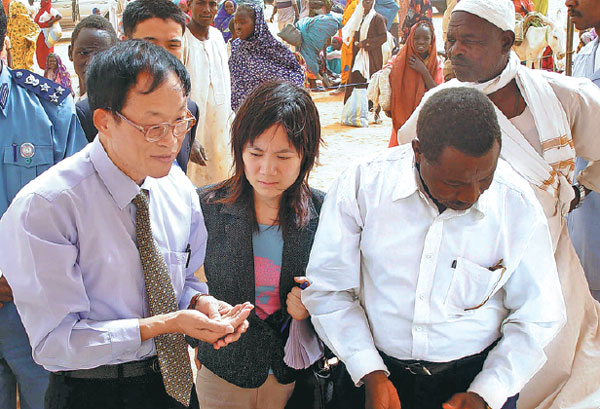Envoy looks to objective Mideast role
Updated: 2016-04-11 08:31
By Zhang Yunbi in Beijing and Chris Peterson in London(China Daily)
|
||||||||
New appointment part of increasing involvement by China on world stage
Xie Xiaoyan, who has been involved in talks over the Iran nuclear situation and South Sudan, has just embarked on a demanding new mission - as China's first special envoy on the Syrian issue.
The 62-year-old, whose appointment was confirmed on March 29, said the post is a sign of China's greater involvement in resolving the issue and its willingness to contribute "wisdom and solutions".
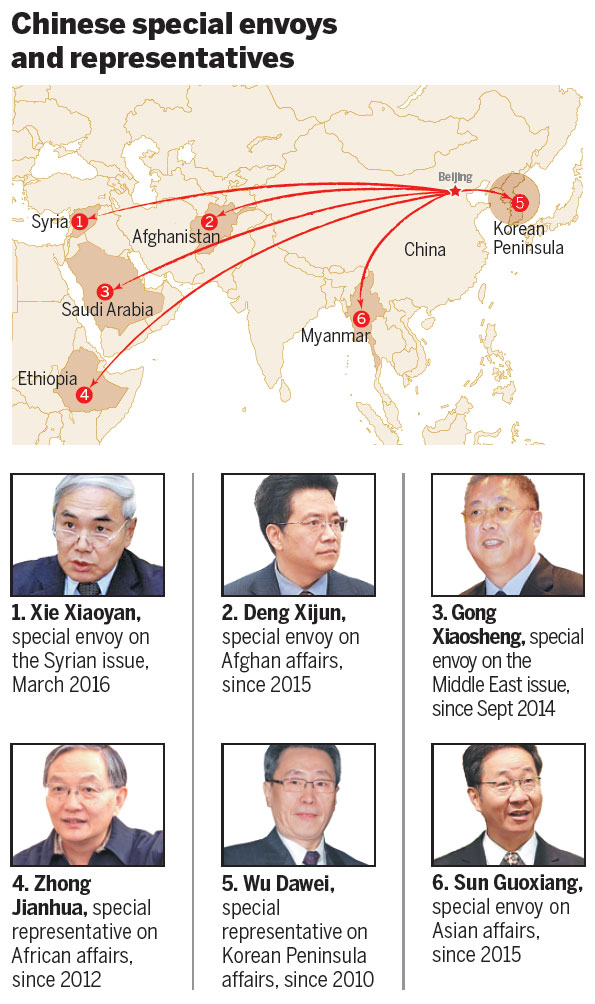
Veteran diplomats said the increasing number of envoys comes from China's expanding involvement in global issues - including Syria - and its increasing national interests.
"It's because China upholds an objective and fair stance on the Syria issue that there are increasing calls from the international community for the Chinese to play a greater role," Xie said over the weekend.
Beijing has had a constant role in global efforts to tackle the Syria issue, communicating with both the Syrian government and the opposition to boost peace talks.
Xie takes his new title at a time when "special envoy diplomacy" is playing an increasing role in China's foreign affairs. The country now has at least six special envoys or representatives working on hot issues.
The United Nations and the United States have also appointed envoys - Staffan de Mistura and Michael Ratney respectively - to tackle the Syria issue, which has flared for five years.
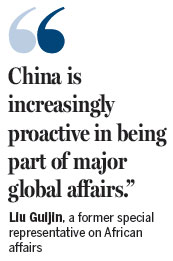
Gong Xiaosheng, special envoy on the Middle East issue, said there are five hot spots in the region and that the Syria issue is "of great complexity".
Liu Guijin, a former special representative on African affairs, said, "The number of China's special envoys will continue to rise. China is increasingly proactive in being part of major global affairs."
Bill Jones with Executive Intelligence Review, a weekly US magazine, said US special envoys are often appointed "only for the duration of the 'crisis' or 'situation' for which he or she has been assigned".
"Because of their designation, special envoys can often bypass ordinary diplomatic channels and confer directly with the secretary (of state) or with the White House, possibly even the president, on the matter for which he or she has been assigned responsibility," he said.
Jonathan Cristol, a fellow at the World Policy Institute, said special envoys "can be a very useful tool" for China to safeguard its global interests, and it is hoped that such envoys will "have wide-ranging personal relationships with multiple actors".
Allan Fong and Amy He in the US and Wang Xu in Beijing contributed to this story.
Contact the writers through zhangyunbi@chinadaily.com.cn
Timeline
1956: China's "special envoy diplomacy" initiated as Vice-Premier He Long attends Iskander Mirza's inauguration as Pakistani president.
1984: Vice-Minister of Foreign Affairs Qian Qichen participates in the fourth round of governmental consultations between China and the Soviet Union as a special envoy. This heralds a new era for the position of envoy, from one of largely ceremonial activities, to one of enhanced responsibilities involving bilateral negotiations.
1991: Vice-Minister of Foreign Affairs Yang Fuchang, as special envoy, visits several countries in the Middle East and expresses China's basic position on the Gulf War. This sees the role evolve from bilateral to regional and global issues.
September 2002: Government appoints Wang Shijie as its first special envoy on the Middle East issue.
March 2016: Government appoints Xie Xiaoyan as special envoy on the Syrian issue, marking greater significance for the role.
Chinese diplomats build global experience
Most Chinese diplomats assigned as envoys on a specific issue or region have a wealth of experience and knowledge.
Wu Dawei, 70, the country's special representative on Korean Peninsula affairs, was appointed in 2010, shortly after finishing his previous job as vice-minister of foreign affairs.
Hemay be one of China's busiest envoys, especially since February when nuclear tests by the Democratic People's Republic of Korea led to an escalation of tensions.
He has embarked on at least three overseas trips since February, to Pyongyang, Seoul and Japan, according to the Foreign Ministry.
Liu Guijin, a former special representative on African affairs, said unlike Foreign Ministry spokesmen and women, who usually state positions concisely, envoys are expected to "elaborate and explain China's stance in their own words".
"Some reporters from the West have an in-depth understanding of a certain issue. So you have no choice but to learn more and make full preparations if you are to answer their questions smoothly," he said.
|
Liu Guijin (left) inspects a food distribution project in Darfur, Sudan, in May 2007. Shao Jie / Xinhua |
(China Daily USA 04/11/2016 page1)
- Beijing's Zhongguancun Street gets facelift fund
- Online platform established to help former soldiers find jobs
- Shenzhen starts work on Asia's longest subway station
- Scenery of flowerbeds at Marco Polo Flower World in E China
- Zhengzhou bus company launches wake-up service
- Officials grilled on TV over job conduct
- Envoy to Middle East covers a lot of ground
- India detains 5 as temple fire kills 112
- Earthquake of 7.1 magnitude hits Afghanistan, Pakistan, India
- Sixth anniversary of Smolensk plane crash marked
- Ukrainian PM resigns, paves way for government dissolution
- World Bank unveils $25b aid plan to fight climate change

 Actress Zhang Ziyi celebrates 100th day of her daughter
Actress Zhang Ziyi celebrates 100th day of her daughter
 19-year-old hit by train while taking selfie, dies on the spot
19-year-old hit by train while taking selfie, dies on the spot
 Striking images around world in week: April 4 - April 10
Striking images around world in week: April 4 - April 10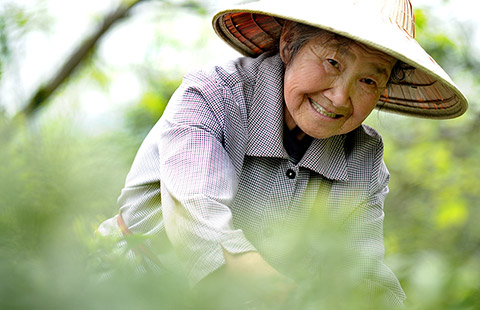
 A woman who started business in her 70s
A woman who started business in her 70s
 Installation of largest single-aperture spherical telescope to finish
Installation of largest single-aperture spherical telescope to finish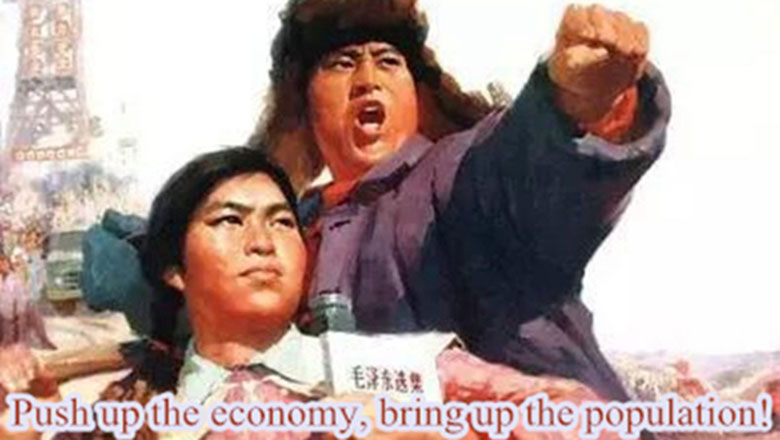
 Slogans for family planning need to be updated
Slogans for family planning need to be updated
 26,000 Kung Fu students form huge patterns
26,000 Kung Fu students form huge patterns
 Chinese arts prove popular in Hong Kong spring sales
Chinese arts prove popular in Hong Kong spring sales
Most Viewed
Editor's Picks

|

|

|

|

|

|
Today's Top News
Marriott unlikely to top Anbang offer for Starwood: Observers
Chinese biopharma debuts on Nasdaq
What ends Jeb Bush's White House hopes
Investigation for Nicolas's campaign
Will US-ASEAN meeting be good for region?
Accentuate the positive in Sino-US relations
Dangerous games on peninsula will have no winner
National Art Museum showing 400 puppets in new exhibition
US Weekly

|

|
